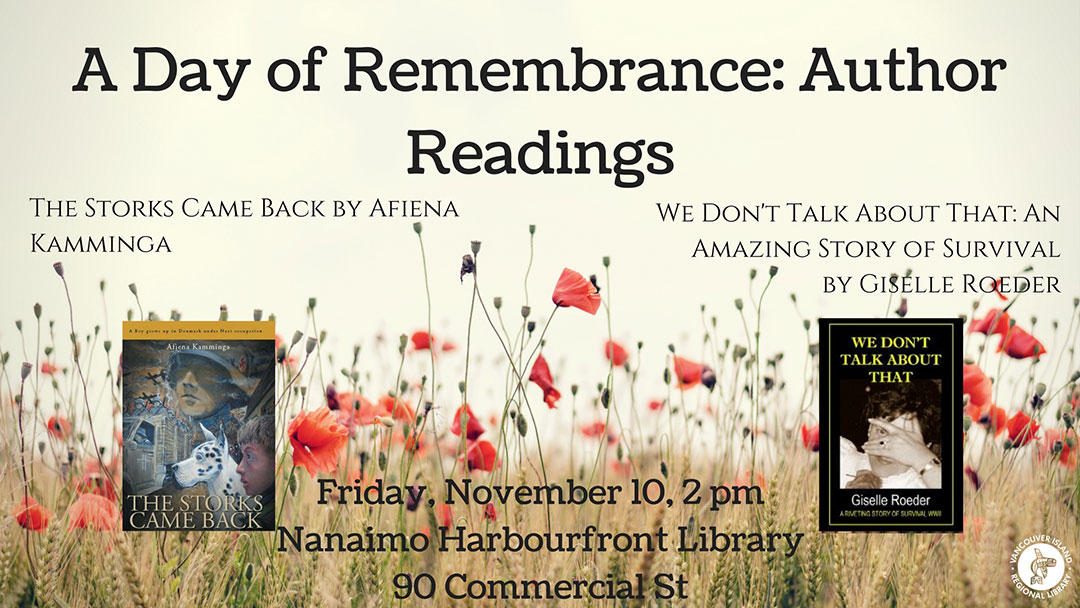Giselle Roeder will be reading from her book of memoirs We don’t talk about that, the author’s childhood memories of being evicted from her home at the end of WWII, and walking with her family for three weeks (together with some 3 million others) plagued by illness and lack of food and shelter, alongside the Russian Army advancing on Berlin.
To find out more about this and other books by this author, turn to her website at giselleroeder.com
Afiena Kamminga will be reading from her new book, The Storks came Back — a Boy grows up in Denmark under Nazi occupation
THE STORKS CAME BACK by Afiena Kamminga
A Boy grows up in Denmark under Nazi Occupation
Why this book?
Afiena Kamminga’s first book-length story for young readers aims to be a cross-over novel to be read by children as well as adults. Young readers will gain a first-hand impression of what it was like for children in a Nazi-occupied country during WWII, to live through those five years of upheaval when children were drawn into the trials experienced by the adults around them. Adult readers of this book will gain a close-up look at everyday life under war and occupation, seen from a child’s point of view.
There are many stories in literature and film featuring WWII battles and those taking actively part in the fighting or in other ways supporting the war effort in a war that (in the literature of English speaking nations) generally takes place ‘overseas.’ There are other, deeply disturbing, accounts of horrific experiences suffered by people, adults AND children deemed unworthy of life and sent to concentration camps to be annihilated in what came to be termed the Holocaust.
But there are far fewer stories in English that tell of everyday life lived by average people struggling through those five years of war, invasion and occupation by Nazi Germany. Many people who lived through these years as children in occupied countries have emigrated to English speaking countries. Each year during Remembrance time in the fall, they are reminded of their childhood years, when war and occupation arrived literally on their doorstep. This book is an attempt to make today’s children aware of the ways in which war affects people’s lives at any age.
Afiena Kamminga is a Canadian author (with roots in the Netherlands). When she learned that the childhood memories of her Danish-born husband ran parallel to her own family history – both families, his in Denmark, hers in the Netherlands, were forced out of their home by occupying German forces – the seeds for this fictional, much of it not truly fictional…, story were sown.
The Storks came Back is the result of their cooperation with valuable input from others who shared their memories of the Nazi occupation in Denmark.
THE STORKS CAME BACK (Summary)
In April 1940 when his country, Denmark, is invaded and occupied by Nazi Germany, seven year old Morten Mors has no idea how his life and that of his family and all other people in Denmark is about to change. School is interrupted. Danish resistance against the German occupiers grows stronger step by step. Morten, eager to join the local branch of the underground resistance movement, is told that he is too young to get involved. Five years later, now twelve, he is still told the same thing. The Resistance is sabotaging railway transports to prevent German troops from heading south to reinforce Hitler’s army battling the Allied on the Western front.
When a German search party is about to discover an explosives stash of the local Resistance — a discovery that would implicate Morten’s family and friends – Morten devises an ingenious plan to save the day. Aided by a friend and his dog he spirits the explosives away against all odds, saving the lives of a number of local resistance fighters.
Visit The Storks Came Back for more details and purchase options

